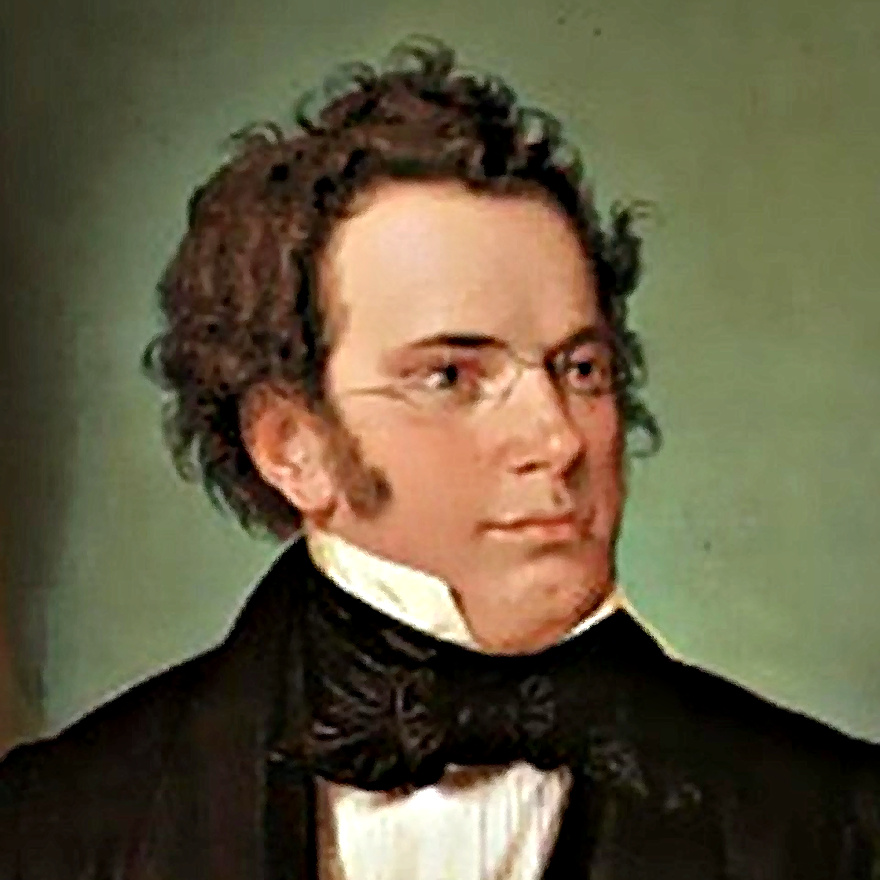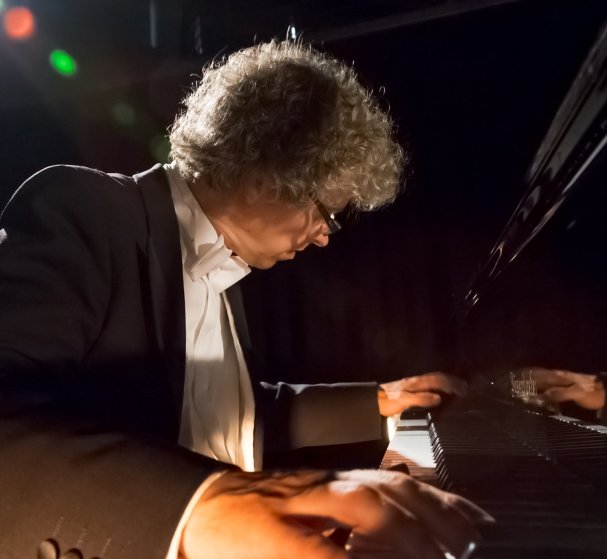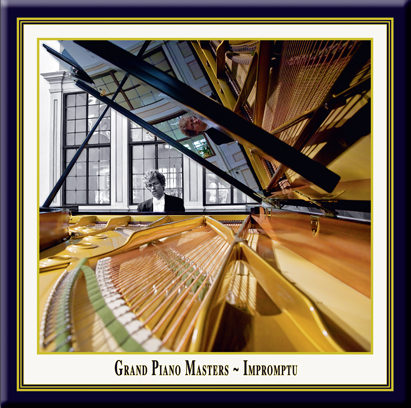Grand Piano Masters · Impromptu
Impromptu
Franz Vorraber plays
Franz Schubert (1797-1828):
Impromptus Opus 90 (D899) I-IV
& Wanderer Fantasy Opus 15 (D760)
Instrument:
Concert Grand Piano: D 280 by C. Bechstein
A concert recording from Bad Homburg Castle in Germany
HD Recording · DDD · c. 63 Minutes



I
n 1827, a year before his death, Franz Schubert wrote the Impromptus at the age of thirty. He grouped these eight pieces into two cycles with four impromptus in each, perhaps so they could be played individually or as a whole cycle.
The first Impromptu in C minor is an unusual piece. Beginning with on a long, drawn-out note, Schubert develops a unison melody that flows up and down in a triplet movement and which he then imbeds in a four-part chorale. The rhythm in this dark key of C minor is that of a march, probably a funeral march, and lends a tense atmosphere, something inescapable, to the whole. Block-like and with no transition, the unison passages are rather like a woodwind chorale and play side by side. The changes of key are abrupt and sudden. As if it were a memory, the motif reappears later in A flat major, the key of dreams and longing. During the entire piece, the contrasts are heightened and varied until the startling change to C major, which is totally unstable and glides again and again into C minor. Seldom do you find a composition where C major and C minor are so close to each other in such a small space. The first Impromptu ends in major, without losing this surreal mood.
In contrast to the march rhythm of the first Impromptu, the underlying rhythm of the second, written in E flat major, is in triple meter, with the second beat always stressed, just like the chime of a bell in answer to the heavy first stroke. Combined with the cascading runs played with the right hand and that start on a triple, the motif common to all four impromptus, this rhythm lends the E flat major impromptu its characteristic sound. In the middle section, Schubert heightens the bell chimes with double sforzati, which let the finally piece end in falling E flat minor runs during the closing measures.
The third Impromptu uses the Schubert "wanderer rhythm", combined with a continuous triplet movement in the melody, which is characterized this time by the falling triple. Even at this slow tempo, Schubert keeps this relentless pattern of movement going right to the end. Again, melodic phrases in the secondary voices, mainly from falling triplets - from G flat to E flat at the beginning, for example - give rise to changes in harmony that introduce a "dreamlike uncertainty" to the piece.
The cycle concludes with the Impromptu in A flat major, where the harmony at the start is rather like an unanswered question. It begins with an A flat minor chord break, leading into the dominant tune after an E flat major as a standing chord, which, without resolution, then flows into a pause. This is followed by a motif with a downward triplet movement, which can scarcely be seen as an answer to the question posed at the start. Schubert's rhythm here is similar to that of the second Impromptu, with stressed long notes on the second beat. Schubert uses these methods consistently to develop the character of the music and thus create perfect masterpieces. In the middle section in C sharp minor, he picks up the long second beat and puts it into the melody, then combines the latter's circular movement with thumping eighth chords played with the left hand. After repeating the start of the piece with its questioning language, the cycle finishes on two loud chords that say very: Now it's over!
The "Wanderer Fantasie", as it is known, was written almost five years earlier, between 1822 and 1823. The words of a line from the Schubertlied, "Der Wanderer", set the theme for the second movement, which, in turn, forms the central sequence of variations that make up the piece. This is a daring, orchestral-like work that is unique even in our times. It consists of four movements built around one rhythmic motif, with each movement flowing into the next without a break, thus turning the four into one whole entity. Although the title of "Wanderer Fantasie" was not Schubert's, the reference to the lied "Der Wanderer" is obvious because of the central theme of the piece. The dominant rhythm pattern also appears in other works by Schubert. Wandering ceaselessly, without ever stopping - this continuous flow ad infinitum pulls everything along with it. It is the wandering of our lives, the relentless flow of time - time, which, as a symbol in the arts, is perhaps best represented by music. This wandering may well be interrupted by dreams, as in the 2nd movement, but it remains an ungovernable force that cannot be escaped. At the end of the third movement, Schubert composed a tremendous crescendo of sound that was probably too much for the instruments of that time to cope with and which merges into a fugued fourth movement in octaves, where sound unfolds in all possible registers. The notes are distributed up and down the entire keyboard, and there are chord tremoli and octave runs galore, all of culminate in an untamed flood of sound in C major.
Franz Vorraber in November 2007

B
orn in Graz (Austria), Franz Vorraber has been fascinated by the piano since his early childhood. At the age of seven, he played the organ in church standing up - as he could hardly reach the pedals. At the age of thirteen, he was admitted to the piano class for exceptional students at the Music Conservatory in Graz, also learning the violin. The Viennese School in the tradition of Bruno Seidlhofer and the traditional German school of Wilhelm Kempff, handed down by Joachim Volkmann, dominated his study years, and he graduated with a soloist diploma and unanimous decoration. He has won many prizes for his skills on the piano. Here, just some of the awarders: the Austrian Culture Minister, the piano manufacturers Bösendorfer in Vienna and the city of Graz. He also won the Joachim Erhard prize. He completed his studies in Frankfurt and Graz receiving unanimously the highest awards.
Franz Vorraber is one of the internationally renowned interpreters of Schumann. He repeatedly performed the complete solo oeuvre in cycles of twelve concertos and was published it in a thirteen-part CD recording at Thorofon, receiving numerous international awards and honors. Franz Vorraber was invited as soloist to internationally famous festivals as the Viennese Musiksommer, the piano festival Ruhr, the music festival Schleswig Holstein, the Mozartfest Würzburg, the Mendelson fest in Leipzig, the Klosterfestspiele Maulbronn, the Musiksommer of Chorin, the European Weeks of Passau, the Frankfurter Feste, the festival Santander, the Schubertiade, the Rheingau music festival, the Hohenloher Kultursommer, the Bebersee festival et cetera. He worked with conductors like Dennis Russell Davies, Fabio Luisi, Alun Francis, Gabriel Feltz, Mar Tardue or Marcus Bosch. His repertoire of piano concerts includes 50 different concerts, many of them have been have been released on CD.
His own works as a composer have been increasingly performed lately. There have been many premieres of pieces of chamber music at the Mendelson Fest at the Gewandhaus or at the Schumann Fest in Bonn in cooperation with the blowers of the Staatskapelle Berlin and musicians of the Gewandhaus Leipzig. A great success was the premiere of his first piano concerto at the Klosterkonzerte Maulbronn. Some works of piano were published by Thorofon and by K&K Verlagsanstalt, i. a. "Sentences of Love" in cooperation with the poet and writer Peter Härtling.
P
ublishing Authentic Classical Concerts entails for us capturing and recording outstanding performances and concerts for posterity. The performers, audience, opus and room enter into an intimate dialogue that in its form and expression, its atmosphere, is unique and unrepeatable. It is our aim, the philosophy of our house, to enable the listener to acutely experience every facet of this symbiosis, the intensity of the performance, so we record the concerts in direct 2-Track Stereo digital HD. The results are unparalleled interpretations of musical and literary works, simply - audiophile snapshots of permanent value. Flourishing culture, enthralling the audience and last but not least also you the listener, are the values we endeavor to document in our editions and series.
Music that is new, pieces worth listening to and well worth conserving, little treasures from the traditional and the avantgarde - music that is unimaginable anywhere else but in the hotbed of Europe - we capture these in our Castle Concerts Series of recordings in their original settings in cooperation with Volker Northoff.
The concert grand piano is incontestably the king of instruments. We could now wax lyrical about its incomparable dynamics and go into its ability to go from the tenderest of sounds in a soft minor key to the magnificent power of a fortissimo, or I could rhapsodise about its impressive size and elegance. But what makes this instrument really fascinating is its individuality, since each one is unique in itself - created by a master. A concert grand has a life all of its own that a virtuoso can really "get into" and hence bring the work of the composer to life. In our Grand Piano Masters Series, we get into the character and soul of the concert grand piano and experience, during the performance itself, the dialogue between the instrument, the virtuoso and the performance space.
Andreas Otto Grimminger & Josef-Stefan Kindler, K&K Verlagsanstalt
1. Concert Start
Franz Schubert (1797-1828):
2. Impromptu in C Minor, Op. 90 No. 1, D 899/1
3. Impromptu in E-Flat Major, Op. 90 No. 2, D 899/2
4. Impromptu in G-Flat Major, Op. 90 No. 3, D 899/3
5. Impromptu in A-Flat Major, Op. 90 No. 4, D 899/4
Franz Schubert (1797-1828):
6. Fantasia in C Major, Op. 15, D 760 "Wanderer Fantasy"
Concert Grand Piano: D 280 by C. Bechstein (No. 191784)
Concert Date: April 2007

***** A wonderful and delicate piece of music...
I wish to write this review not only praising the quality and beauty of music contained on this album but also to thank K&K Verlagsanstalt personally for their generosity towards me. I am a film student who has just finished producing my graduate film. During post production I sort through many different recordings of Schubert Impromptus in particular the Impromptu Op.90 No.3 in G flat major. I felt this music would be appropriate for my film as it holds a certain bitter sweet quality that is rarely found is seldom come across. I chose the recording of K&K's as I believed it to be the most beautiful, with the lovely expression contained in the performance and overall clarity of the piece. I contacted K&K shortly after hearing it and they were kind enough to grant me the use of their recording for which, I am forever grateful.
I cannot explain my gratitude towards K&K Verlagsanstal and also Franz Vorraber for such a virtuoso performance. All I can give is my support of their products and recommendation to others purchase their music.

***** Beauty
This is real music... it's classic and its a beautiful melody... verry catchy and it's soothing. Pretty much just awesome!... not kiddnig.

Qualitative recording
This is a qualitative recording without background noise.





***** Qualitative recording
12. July 2013 - 17:19 — kuk-art.com'TianSky' on iTunes
***** Beauty
8. November 2012 - 21:11 — kuk-art.com'Holly Jo McCoy' on iTunes
***** A wonderful and delicate piece of music...
8. November 2012 - 21:07 — kuk-art.comI cannot explain my gratitude towards K&K Verlagsanstal and also Franz Vorraber for such a virtuoso performance. All I can give is my support of their products and recommendation to others purchase their music.
'Glynncat' on Amazon.com